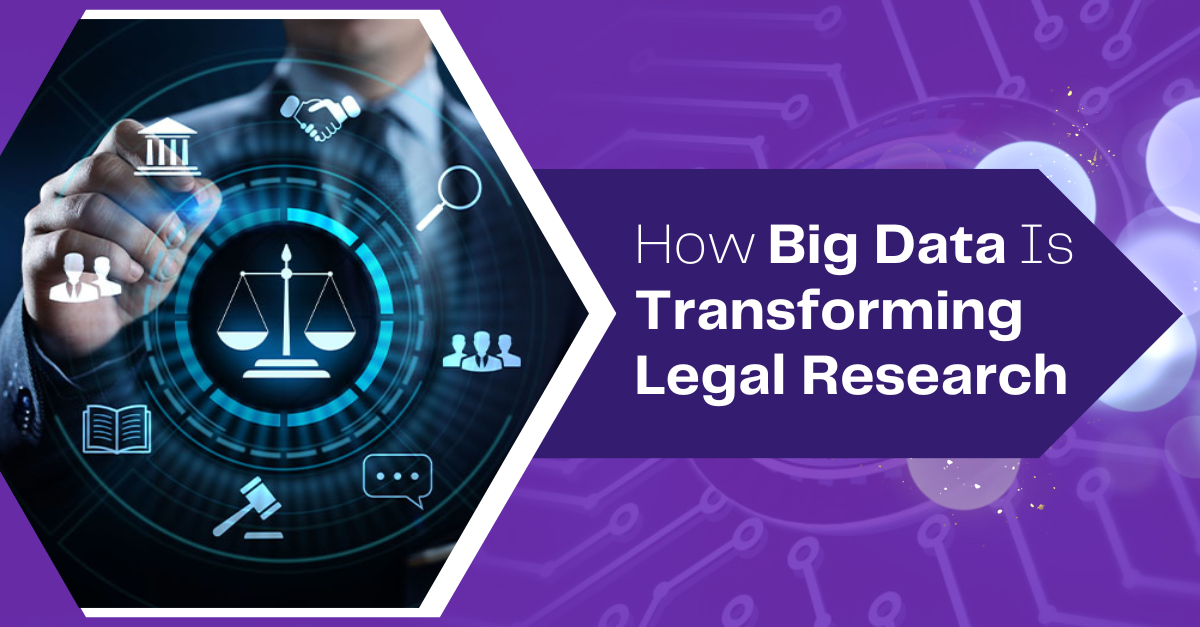
Big data and technology are revolutionizing legal research.
Yes, you heard it right!
Big data and technology are revolutionizing legal research as well.
The legal field has always relied heavily on rigorous research and analysis to provide accurate and well-founded counsel. Traditionally, this procedure included digging through huge libraries of legal texts, case law, and statutes to find relevant information.
However, with the advent of big data and advancements in technology, legal research has been undergoing a transformative shift. The integration of big data analytics is revolutionizing the way legal professionals’ access, analyze, and interpret information, paving the way for more informed and efficient decision-making.
However, allow me to first introduce you to BIG DATA.
Big data refers to the vast and complicated datasets that can’t be processed using conventional data processing techniques. It entails gathering, archiving, and processing vast amounts of data from numerous sources, including social media, sensors, transactions, and more. Big data has three key qualities, which are as follows:
Volume: The data’s actual size, which is sometimes expressed in terabytes, petabytes, or even bigger units.
Velocity: The rate at which data must be produced and processed in real-time or very near real-time.
Variety: The data is available in a range of formats, including unstructured (such as text and photos), semi-structured (such as XML), and structured (such as databases).
Now let’s find, How Big Data Is Transforming Legal Research and having a significant impact on the legal system.
- Access to a Vast Universe of Legal Information:
As of 2020, the digital universe was estimated to be around 44 zettabytes, and it is expected to grow to 175 zettabytes by 2025.
It won’t come as surprise to know that Legal data constitutes a significant chunk of this enormous digital repository.
Big data has revolutionized legal research by granting access to an immense universe of legal information. Legal practitioners today have instant access to case law, legislation, court judgements, and legal opinions.
This enhanced access makes it more feasible for attorneys to spot trends, patterns, and previous cases, which results in stronger arguments and well-founded advice for their clients. - Enhanced Risk Assessment and Case Prediction
Big data analytics has been proven to increase case prediction accuracy by up to 25%.
By analyzing extensive datasets of historical cases, big data analytics can identify patterns that influence past outcomes. Legal experts can then forecast the chance of success in current or future cases because of this.
By harnessing the power of big data, lawyers can offer clients more accurate assessments of potential risks and outcomes, enabling them to make informed decisions about settling or proceeding to trial. - Boosting Legal Research Efficiency
A report by McKinsey & Company states that legal research efficiency can be boosted by up to 40% with the integration of big data analytics.
Traditionally, conducting legal research required poring over legal texts by hand for hours. However, big data has transformed this process into an efficient and time-saving endeavor.
Legal practitioners can now emphasis on analysis rather than information retrieval because of sophisticated algorithms and machine learning software that can quickly scan and classify enormous volumes of data. This newfound efficiency allows lawyers to handle more cases simultaneously and deliver better client service. - Identifying Hidden Links and Patterns
According to a study published in the International Journal of Legal Information, big data analytics can identify hidden connections and patterns with an accuracy of up to 93%.
Finding underlying relationships and patterns that can influence a case’s outcome is a common task in complex legal cases. Big data analytics can cross-reference diverse datasets to uncover correlations that might have otherwise gone unnoticed.
For example, in complex litigation cases, data analysis might reveal connections between seemingly unrelated events or parties, shedding light on potential motives or collaborations. This novel insight has the potential to drastically affect the course of a court proceeding and the strategy used to develop a convincing defense.
Big data’s integration into legal research has unlocked a treasure trove of valuable insights, transforming the way legal landscape. As technology continues to evolve, clients expect even more powerful and sophisticated applications, empowering legal professionals to make well-informed decisions and provide unparalleled counsel.
LegalxGen has come up with an all-round solution package. Because we understand that: Embracing big data is no longer an option but a necessity for legal practitioners looking to stay ahead in the fast-paced and ever-evolving world of law.
Join us for a FREE DEMO now!

Market Research Analyst with a Master’s in Marketing and Analytical Experience.
 English
English French
French German
German

